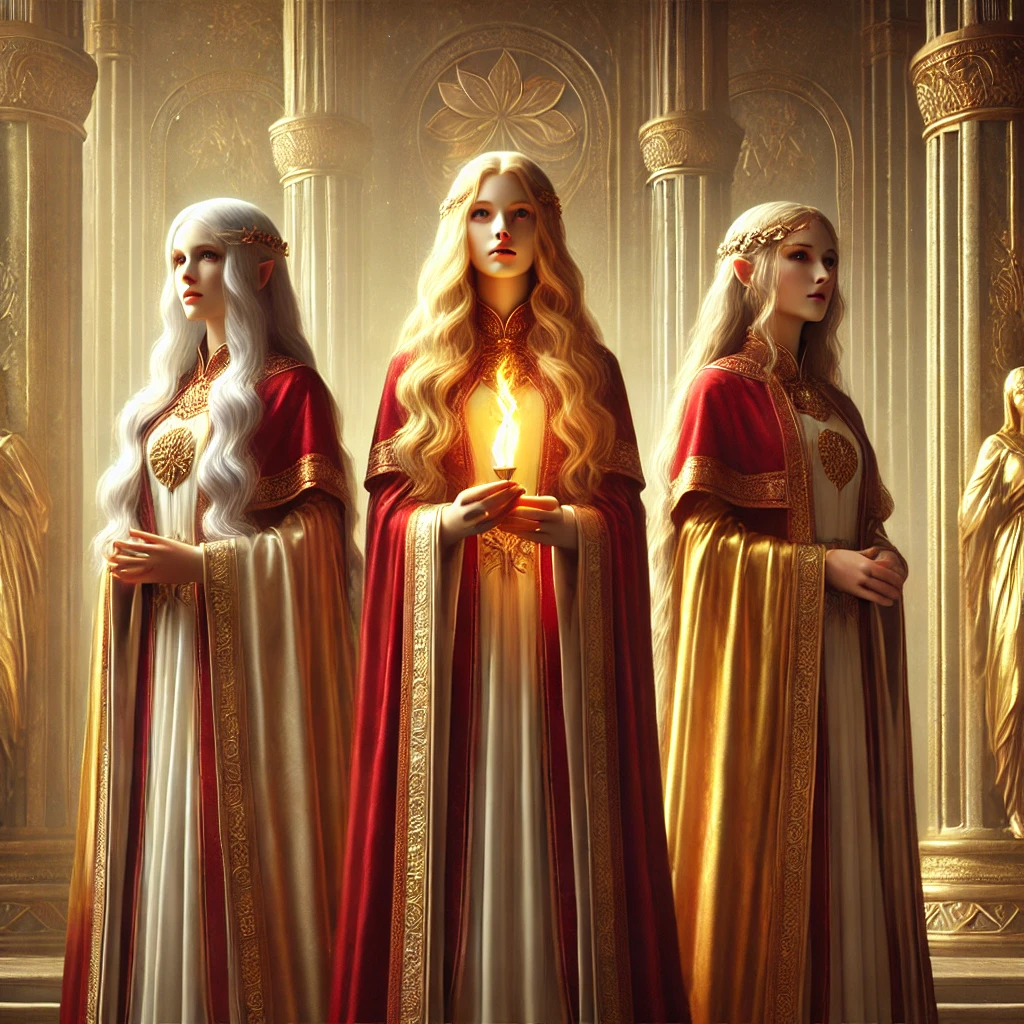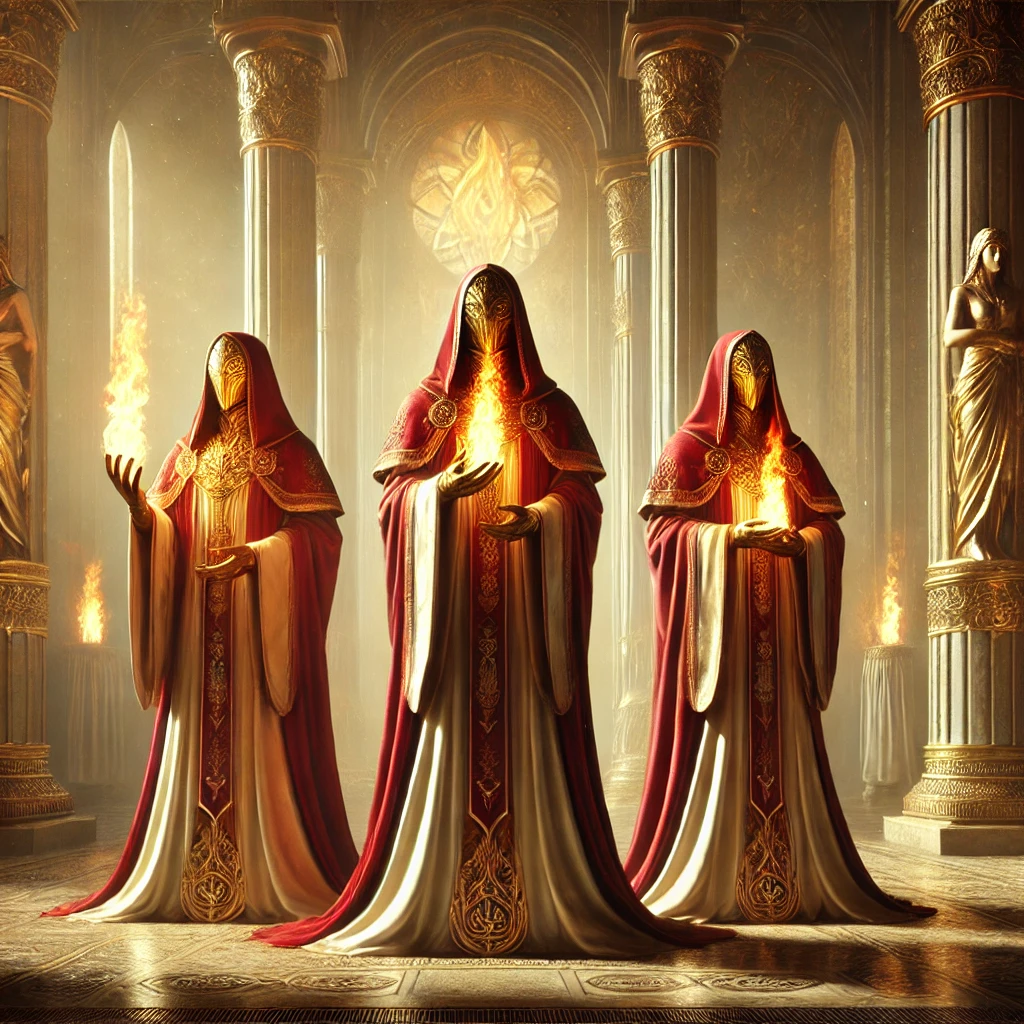The Cult of Elendir Before the Pact War
Before the rise of the Athesian Empire, the Cult of Elendir was but one of many religious traditions among the elves of Ysvadell. Unlike other gods, who embodied broad and universal forces, Elendir was unique—he was a mortal who had ascended, a legendary warrior-king whose deeds reshaped the world.
Elendir was worshipped not as a god of nature, the elements, or abstract ideals, but as a divine ruler, a symbol of conquest, wisdom, and strength. His cult was particularly strong among warriors, statesmen, and scholars, who saw in him the ideal of elven superiority. However, he was never the sole focus of elven faith—his worship coexisted with that of the traditional pantheon, just as various cults and mystery traditions flourished across the elven lands.
The Cult of Elendir saw three key aspects of his divinity:
- Elendir the Warrior – Patron of generals and conquerors, revered for his legendary campaigns against the dragons and his role in shaping elven civilization.
- Elendir the Lawgiver – Celebrated as the architect of elven order and wisdom, his name invoked in matters of governance, diplomacy, and leadership.
- Elendir the Ascendant – A being who transcended mortality, offering a path to enlightenment through discipline, knowledge, and devotion.
Temples to Elendir stood in every major city, though they did not dominate religious life. His followers performed elaborate rites, honouring him with games, processions, and war sacrifices. It was common for victorious generals to offer trophies of war at his altars, and for aspiring rulers to take oaths before his statues.
The Pact War and the Transformation of the Cult
The Pact War changed everything.
When Prince Adorellan of Ysvadell was assassinated in Rothenia, the Cult of Elendir was among the first to call for war. They saw his death not as a mere political tragedy but as an affront to elven supremacy—a divine justification for vengeance. As the war raged on, the cult’s influence grew. Generals, seeking favor in battle, called upon Elendir’s name with greater fervor. Priests of the old gods warned against unbridled zeal, but they were increasingly drowned out by voices proclaiming that Elendir alone would lead the elves to victory.
Then came the disaster of Year 85 PW—the Cataclysm at Kei Lenora. The elven archmages, in their desperation to repel Lady Kateryna’s forces, unleashed a cataclysmic spell that annihilated the battlefield, but at a terrible cost. Entire armies vanished in eldritch flames, and Ysvadell itself was left scarred. The Pact War had lasted a century, and now both sides were broken.
When the dust settled, the Cult of Elendir emerged stronger than ever. They declared the war a divine test, a crucible from which the elves must emerge purified. And they had a new champion—Tassarion.
Tassarion, a war hero and former general, took the devastation of the Pact War as proof that the elves had grown weak, divided by their worship of too many gods. He seized power and declared that Elendir, not the fractured pantheon, had ordained him to unify elvenkind. The Sword Pact was abolished, the Athesian Empire was born, and the Cult of Elendir became the state religion.
The Faith of the Athesian Empire
"There is but one path, one truth, one god."
— Edict of the Imperial Concilium
Tassarion’s rule changed elven religion forever. The old gods were cast down, their worship forbidden. The Cult of Elendir was no longer just a revered tradition—it became the only faith permitted in the empire. The temples of Aurielis, Sylthara, and the others were looted, their priests executed or sent into exile. The Empire declared that Elendir was not merely an ascended ruler, but the only true god, and that Tassarion was his chosen heir.
Elven religious life became rigidly controlled and faith became less about personal enlightenment and more about loyalty to the state. Worship of Elendir was woven into every aspect of life, from military rituals to civic ceremonies.
The Temples of Elendir
The grand temples of Elendir, known as Oracles of the Ascendant Flame, dominate the cities of the empire. Each temple serves multiple functions:
- Religious Centre – Daily prayers and sacrifices are held, including ritual games and contests of skill.
- Imperial Propaganda – Statues, murals, and sermons constantly reinforce the narrative of Elendir’s divine will and the empire’s destiny.
The largest temple, the Grand Temple of Kei Lenora, is both a religious site and an imperial fortress, its halls filled with golden mosaics depicting Elendir’s conquest and the greatess of elven power.
The Rites of the Faithful
The Athesian faith is a religion of state and spectacle. Devotion to Elendir is demonstrated through grand ceremonies and deeply ingrained traditions.
- The Games of Ascension – Public athletic contests held in Elendir’s honor, where champions battle in tests of strength and strategy.
- The Rite of the Crimson Oath – Every soldier swears an oath before a flame said to burn with Elendir’s spirit. Those who break their oaths are executed.
The Vestals of the Eternal Flame
One of the most controversial aspects of imperial faith is the Order of the Eternal Flame, an elite priesthood modeled after the old vestal traditions. These young elven women, known as Flamebearers, are sworn to absolute purity and devotion.
- They tend to the Sacred Flame of Elendir, an undying fire said to be the god’s presence on earth.
- They serve as prophetic oracles, believed to hear Elendir’s voice.
- Breaking their vows is punishable by being buried alive, a fate meant to symbolize their separation from Elendir’s light.
Though the Flamebearers are revered, their role is one of both privilege and captivity. Some whisper that they are little more than political tools, used to justify the Emperor’s will.
The Emperor: The Living Heir of Elendir
The Emperor is the supreme authority in the Athesian Empire, not merely a ruler but the living vessel of Elendir’s will. While Elendir is revered as the god who ascended, it is the Emperor who reigns, commands, and enforces divine order. His word is law, his decrees are sacred, and his dominion is eternal. Though not openly declared a god, devotion to the Emperor surpasses even that of Elendir—he is the conduit through which the divine speaks, the embodiment of absolute rule. To serve him is the highest form of worship; to disobey him is the gravest heresy.
This doctrine is reinforced in all aspects of life:
- The Throne of Elendir – The Emperor sits upon the sacred throne, and no one may approach without his command.
- The Crimson Oath – Every soldier of the Athesian miliray swears fealty, pledging their life to the Empire.
- The Imperial Edicts – All laws are treated as divine scripture, recited in temples alongside prayers.
- The Custodes Imperialis – His silent, masked enforcers ensure his will is never questioned.
- The Festival of the Sunrise – An annual display of the Emperor’s power, where oaths of loyalty are renewed, and dissenters are purged.
In the Empire, faith and obedience are one—Elendir may have risen beyond mortality, but it is the Emperor who rules, and to defy him is to defy the divine.











Comments